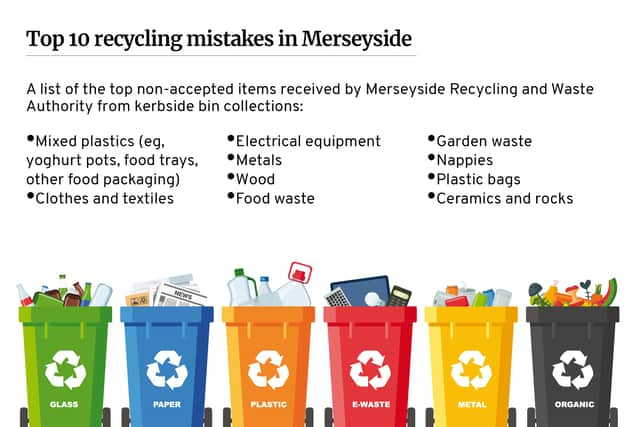Almost 10,000 tonnes of Liverpool recycling waste rejected for wrong bin use - 10 most common mistakes
and live on Freeview channel 276
Almost 10,000 tonnes of waste from Liverpool households was wrongly placed in recycling bins last year, new figures show.
The Local Government Association (LGA) said households and councils have worked hard to increase the amount of waste recycled, but are held back by manufacturers using unrecyclable packaging.
Advertisement
Hide AdAdvertisement
Hide AdRejected waste material can be turned away from recycling due to contamination by water, dirt, or chemical treatments such as preservatives or paint.
Figures from the Department for Environment Food and Rural Affairs show an estimated 9,516 tonnes of household waste were rejected from being recycled after being placed in the wrong bin in the year to April 2022.
It is down from 9,946 tonnes the year before – the highest level on record – but up from 1,571 tonnes in 2014-15 when local records of rejects began.
- Last year’s rejects in Liverpool accounted for 17.8% of the 53,558 tonnes of household waste sent for recycling in the region.
- In Liverpool, 44,042 tonnes of household waste were recycled – 22.9% of all rubbish. It was down from a recycling rate of 23.5% in 2020-21.
Recycling mistakes in Liverpool
Liverpool’s kerbside recycling collection service accepts paper, cardboard, glass jars, glass bottles, plastic bottles, drinks cans and food tins. But there are still a number of things that residents mistakenly throw into their recycling bins at home.


Advertisement
Hide AdAdvertisement
Hide AdA Local Government Association spokesperson said households have made a “real shift” to ensure they are recycling as much as possible while councils work hard to share information on what can be recycled.
“However, the manufacturers of plastic packaging products are still continuing to create and sell packaging that cannot be recycled and will be put in the recycling bin by people in good faith,” the LGA added. “The burden then falls on councils to not only collect it and dispose of it, but to pay the extra cost of disposing of it.”
They added councils are trying to achieve net zero with “one hand tied behind their back” as manufacturers continue to produce plastic that cannot be disposed of sustainably.
National statistics: The increase in rejected material reported across England is also likely due to China’s ban on all solid waste imports and effects of the Covid-19 pandemic.
- Across England, 6.4% of rubbish sent to be recycled in 2021-22 was rejected.
- The figures show 44.1% of household waste in England was recycled in 2021-22 – up slightly from 43.8% the year before.
Advertisement
Hide AdAdvertisement
Hide AdA Defra spokesperson said: “There was an increase in rejected material reported by local authorities in the wake of the pandemic but we have since set a suite of targets to reduce different types of waste, including plastic, glass, metal, paper and food by 2028 through our landmark Environmental Improvement Plan.”
The plan aims to ban the supply of single-use plastics later this year, make some businesses pay to recycle their own packaging by 2024, and introduce a deposit return scheme for plastic and metal drinks containers in 2025.